Interview: Jeremy Jordan of CARRY ON, Debuting on 54 Below Premieres May 6th
"I've reached a point in my career where I want to take ownership of everything I do and be proud of every thing I do."
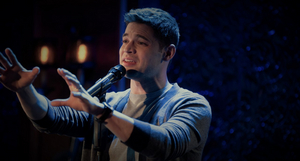 Imagine you're an artist, let's say a performing artist, and you spend your life growing, evolving, opening up like a bloom, finding the truest versions of yourself and your artistry. Imagine that you push yourself to the most personal artistic place you've ever been, premiering your newest production to sold-out houses and rave reviews. Now imagine a global pandemic immediately shuts down the world, the country, the business, and your chances of performing that show before it ages out... because that's what happened to Jeremy Jordan.
Imagine you're an artist, let's say a performing artist, and you spend your life growing, evolving, opening up like a bloom, finding the truest versions of yourself and your artistry. Imagine that you push yourself to the most personal artistic place you've ever been, premiering your newest production to sold-out houses and rave reviews. Now imagine a global pandemic immediately shuts down the world, the country, the business, and your chances of performing that show before it ages out... because that's what happened to Jeremy Jordan.
In February 2020, Jeremy Jordan debuted his new cabaret, CARRY ON, at Feinstein's/54 Below. The one-act musical play with a script created at his own hand was all about all the feelings he was having about being a new dad. From the elation to the frustration, every joyful, terrifying, optimistic, worrisome, natural thought and emotion that comes with a newborn was expressed in his words, and songs carefully curated to go with his monologues about his daughter Clara, only a few months old, and at home in her crib.
Well, Clara's a toddler now, and only a lucky handful of cabaret-goers had the privilege of seeing Carry On. Soon, though, people everywhere will have the chance to check out Jeremy Jordan's journey into fatherhood because on May 6th a brand-new film version of Carry On will debut online via 54 BELOW PREMIERES.
During the time of the pandemic Mr. Jordan and his ever-present partner in art, musical director Benjamin Rauhala, joined forces with a team of filmmakers to create a freshened-up version of Carry On - not a filmed concert, but a film of a musical play, a one-man show about fatherhood, the lessons we learn, and the things we pick up and put down along the road of life.
Before Carry On is welcomed to the light on May 6th, I asked to have back-to-back conversations with Misters Jordan and Rauhala, and The Delightful Duo said yes, with Ben hitting the hot seat first (read Rauhala's interview HERE), and Jeremy joining in the following day, to talk about their fellowship, CARRY ON, and all those diva power ballads.
This interview was edited for space and content.
Jeremy Jordan, welcome to Broadway World. Just before lockdown, you premiered your new show Carry On at 54 Below. This is your most personal show to date - a show about becoming a dad. Did you have any hesitation about going so intimate with your storytelling?
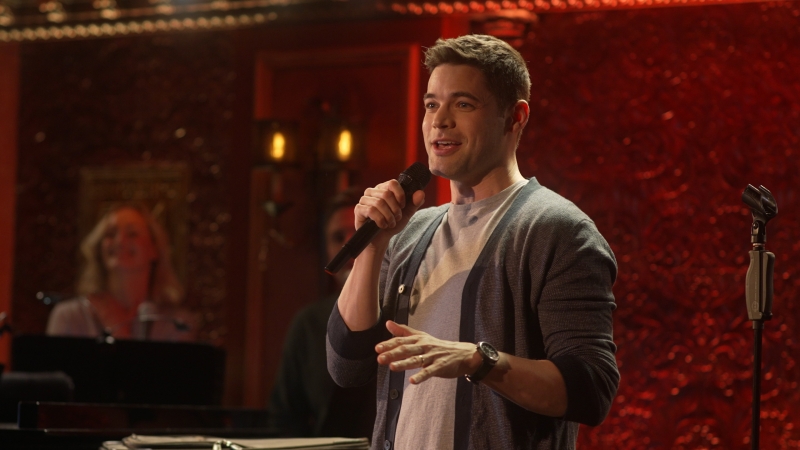 Oddly, no. I've always been weirdly open to telling my stories to people. I don't know if it's because I feel like they're always itching to be leaked out of me, and I sort of tend to always hold them in, and my body is constantly thinking, "No, you got to get this out. Let go of this." I also feel like I live in a world and in a career where I'm always telling other people's stories, right? I'm always entertaining people with other people's words and songs and there's freedom to that in that you're sort of protecting yourself a little bit, but it always feels more false. And as an artistic person, the best feeling that I ever get is when I tell something true. Whether it's me channeling something personal through the words that I'm singing in a song or telling something that's real that happened to me, or singing a song that I wrote, it's a different kind of feeling, it's a deeper connection. It's something that I own... and I've done so much in the past that I haven't really taken ownership of. I feel like I've reached a point in my career where I want to take ownership of everything I do and be proud of everything I do. The best and easiest way for me, that I can think of, to go about it is to create something of my own, something that's personal, something that's real. Real things that actually happened is a great place to start, at least in my mind. And it's therapeutic at the same time because I get to control the narrative of my life in a way that I didn't get to control it back then. It's a way of taking things, whether painful or unfinished, from your past and making them into something palatable, something beautiful, something that you can share and inspire people with, as opposed to something that might be weighing on your heart or something that you're just holding in and is holding you back.
Oddly, no. I've always been weirdly open to telling my stories to people. I don't know if it's because I feel like they're always itching to be leaked out of me, and I sort of tend to always hold them in, and my body is constantly thinking, "No, you got to get this out. Let go of this." I also feel like I live in a world and in a career where I'm always telling other people's stories, right? I'm always entertaining people with other people's words and songs and there's freedom to that in that you're sort of protecting yourself a little bit, but it always feels more false. And as an artistic person, the best feeling that I ever get is when I tell something true. Whether it's me channeling something personal through the words that I'm singing in a song or telling something that's real that happened to me, or singing a song that I wrote, it's a different kind of feeling, it's a deeper connection. It's something that I own... and I've done so much in the past that I haven't really taken ownership of. I feel like I've reached a point in my career where I want to take ownership of everything I do and be proud of everything I do. The best and easiest way for me, that I can think of, to go about it is to create something of my own, something that's personal, something that's real. Real things that actually happened is a great place to start, at least in my mind. And it's therapeutic at the same time because I get to control the narrative of my life in a way that I didn't get to control it back then. It's a way of taking things, whether painful or unfinished, from your past and making them into something palatable, something beautiful, something that you can share and inspire people with, as opposed to something that might be weighing on your heart or something that you're just holding in and is holding you back.
Now that you are taking ownership of your storytelling in this fashion, and you've just mentioned writing songs, do you see yourself writing bigger pieces that come exclusively from your pen?
You mean music-wise?
Music, maybe a play or a novel, stories, anything that might strike your fancy.
Yeah. I've done some of that - I've written music for a long time and it's been relatively private; I've always kind of teased that I was going to release an album, and I've done some recording sessions with some of the stuff that I've written. I released a song that I wrote with a costar of mine back in February - it was just a little ditty but it was a start, a kind of testing of the waters because there is a little bit of reluctance on that side. (See the video for ALIVE below). When you're doing an intimate performance at 54 Below in front of an audience, it's not getting filmed: it's something that you're sharing with just those few people - it's a lot more easy to consider sharing something really deep. When you put something out into the world for literally anybody to take in and assess and potentially criticize, it can be a lot more difficult, but I'm sort of working on that hurdle right now. During COVID I have been given ample amounts of time to start working on other things, so I've written some more songs and I started to make some more connections to actually make the album that I want to make happen. I started a music project with another friend of mine that I'm excited about. I wrote a pilot that I'd always been trying to write, sort of something that I wrote for myself to prove that I could do it. I'm currently working on my first screenplay, and I'm just trying things out. I don't know if I have the patience to write a novel, at least not with a two-year-old at home (laughing) but that's definitely something that I would want to try eventually. I would love to write a play, although I think that any sort of thing that I wrote for the stage would have to be in my blood - I love plays and I loved going to them, but I do feel like if I'm going to do something on stage, there has to be a musical element. You know, all of Carry On was written by me. The whole thing is scripted. I tried to write it to feel non-scripted but it's all word for word. And in the film version, the opening song and the closing song are songs that I wrote. It's kind of a leap of faith for me, you know? (Laughing)
I've seen how gregarious you are when being interviewed by Seth Rudetzky and I've noticed how open you are with your followers on social media, but Carry On is a work of art where you open up about personal moments in your life. Where do the differences and similarities meet and end when social intercourse transcends into art?
Well, I think that art is subjective, and stories about my life are just stories. They're what really happened. I can tell you intimate details about my past because it's something that happened - there's no dispute, it's the fact, it's what made me me, it helped me to grow and learn the things I need to know about myself. Then, when you spin something like that into art, and it becomes something that is subjected to interpretation, that's when that gray area comes into play. People can be like, "Well, I liked that it's super honest and what shaped him, but that song wasn't really my kind of vibe." Or "The lyrics are kinda trite" ... it becomes something to judge, as opposed to something that's true. And it doesn't make it any less true, but it becomes open to interpretation. That's where things get scary. If I'm just telling a story about something that happened, I'm usually pretty confident in the facts, and nobody can really dispute it unless they were there. (Laughing).
Do you think that the artists of the world suffer greatly because of the propensity people on the internet have for open criticism without consideration to the artist's feelings?
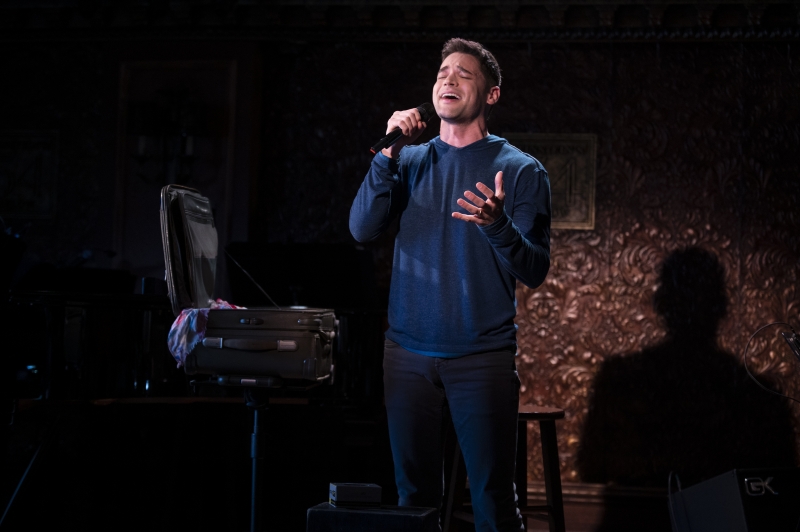 Oh yeah, absolutely. But it's the game, it's the risk we all know we're taking. It's not that anybody that puts something out there doesn't know that. The trick is to learn how to filter it or how to ignore it or how to learn from it... I'm still figuring that out though. I know there's a lot of people that are more heavily influenced by social media and that really affects them and what they create and how they respond to people. I feel like I'm more in the middle there - I don't use social media a lot, but I am still affected by the things that people say. And the vast majority of things you hear on social media, at least at my level of fame, are positive. You start to reach superstar level and everybody knows who you are, and everybody has an opinion. At my (sort of) level of notoriety, the people that know me usually have a positive opinion about me, or at least the people that want to take the time to say something, have a positive opinion. Granted, there are plenty of haters out there, and I've dealt with my share of that, but it's certainly gotten easier. I can only imagine if I start putting music out there that it will be slightly different, and I'm just going to have to learn how to deal with that in my own way. (Laughing) It's scary though.
Oh yeah, absolutely. But it's the game, it's the risk we all know we're taking. It's not that anybody that puts something out there doesn't know that. The trick is to learn how to filter it or how to ignore it or how to learn from it... I'm still figuring that out though. I know there's a lot of people that are more heavily influenced by social media and that really affects them and what they create and how they respond to people. I feel like I'm more in the middle there - I don't use social media a lot, but I am still affected by the things that people say. And the vast majority of things you hear on social media, at least at my level of fame, are positive. You start to reach superstar level and everybody knows who you are, and everybody has an opinion. At my (sort of) level of notoriety, the people that know me usually have a positive opinion about me, or at least the people that want to take the time to say something, have a positive opinion. Granted, there are plenty of haters out there, and I've dealt with my share of that, but it's certainly gotten easier. I can only imagine if I start putting music out there that it will be slightly different, and I'm just going to have to learn how to deal with that in my own way. (Laughing) It's scary though.
You just mentioned your level of fame. Have you experienced any evidence that your work on Supergirl and your work in musical theater created any kind of cross-pollination of your different fan bases?
Oh, sure! There's definitely a diverse crowd in there. There are definitely still people that have no idea that I am a singer, although it's less and less. I do feel like, in terms of fandom, I'm at the level where if you're a fan, you're a fan. There are people that go to social media to follow and watch people in shows and concerts and stuff like that. That's a part of them. That becomes a part of who they are, part of who they are is what they identify with, as a fan, and I think that takes a specific kind of person. Everybody likes things, everybody goes to the movies, everybody goes to a concert every once in a while. But fans have a different vibe, a different energy, and it's almost always super positive. If I reached a higher level of notoriety, you start to seep into the everyday people that aren't just fans, that aren't just the people that really dig into social media and their favorite artists. It's the average person that hears you on the radio or sees you in a random movie that you're in, that knows who you are and doesn't really have a big opinion one way or the other about you. Or they have one judgment about you that they formed at one point and that's it. And I know that I have that about people, about artists, about singers or actors or directors that I don't really know much about, but I could probably give you an assessment of my thoughts of them - that's probably not fair. It's probably based on one thing that I saw: that's just what happens when you get to that level... I'm assuming... I haven't quite made it there.
(Both laughing)
One of the things for which you have become quite well known, and I've even heard you joke about this, is your love of singing power ballads written for women. Where does that come from?
(Laughing heartily) I don't think it's intentional. I think it just happened.... like, it keeps happening. A lot of times it's been people asking me to do that, you know? But I do think that I am more of an emotive person than your average feller. And I think that, really generally speaking, historically, female songs tend to feel more passionate and more emotive to me than male songs. And generally (laughing) the male songs that are really emotive are the really heavy rock stuff, which doesn't always fit my voice really well. But they just have a better catalog of ballads, and ballads, by definition, tell a story - and I'm really only interested in songs that tell stories. So I think it's just been the luck of the draw. Some of the songs are because I did this Miscast concert for MCC for three years and the songs that I've done have been big on YouTube. And my musical director Ben is always asking me to sing songs for his Broadway Loves concerts that always happen to be female singers (mostly), and stuff like that. I think part of it is luck of the draw, but I think there's something to be said about the emotive quality of traditionally female songs that I tend to really connect with a little bit more than male songs, which can be more repressed and be a little bit more introspective, which is definitely something that I connect with on a personal level... but in terms of performance level, I guess maybe not as much,
In the seventies and the eighties when I was studying musical theater that didn't happen, but now people sing whatever they want.
Yeah.
Have you ever considered that you, as a cis straight Broadway leading man singing songs written for women, have helped to light a path for more fluidity in the industry?
I would actually say, no, I wouldn't consider that - I would have actually thought the opposite a little bit. I don't disagree with you but I think in the past I've always felt hesitant about it because I feel like what right do I have to sing this song that was for someone else? And I don't think I've ever taken any job away from anybody by singing a woman's song or anything like that. I hope it's more of an uplifting thing. I think you have to be sensitive about it, but I actually like that outlook on making things feel more fluid. I will say I've never changed the pronoun in a song that was written for a woman, at least not that I can remember. Maybe, if I have, it's been so few and far between or I had to do it to fit a narrative. But I sang "Let It Go and "She Used To Be Mine" and I kept the pronouns; you have to do the song justice and service. And even though I would identify as a cis straight guy, I don't super identify with traditional masculinity, you know? I never have. I think if I was growing up in non-Texas and growing up in 2021, I don't know where I would land. I don't know if I would land fully cis. I mean, I've already developed into what I am now, but I think as I get older and I grow more comfortable with myself, I stop worrying about what other people might see me as, and just try to be as genuine a version of myself as possible. And that version is pretty emotional and sensitive... still super repressed, (laughing) but at the same time comfortable with speaking about that sort of thing. I don't know if that is a fluidity thing or just an emotional personality sort of situation. I do like the way that you phrase that.
You just mentioned how repressed you are. I was on the phone yesterday with Ben and he said to me, "Jeremy's rather quiet." (Jeremy laughs.) And thought, "It's always the quiet ones with the biggest singing voices."
I think that you probably can sense, on this phone call, then I'm a pretty quiet person. I always joke that I'm quiet because I'm saving my voice, (Laughing) which is true sometimes, but I do think that I tend to be a little bit quieter. My wife is always asking me to speak up, she's like, "What? I can't hear you!" I don't know. I can resonate quite boldly and grandly but I don't know why I choose not to. There's probably a sort of self-protection, and I don't want to draw attention to myself. It's a big part of it. I think dating back to before I was anybody noteworthy, I did not like drawing attention to myself. I like to kind of be on the outskirts, observing, sort of studying, and being a quiet person that can speak up and say things when I feel confident enough that I'm going to say something that's not going to sound stupid, you know? I think that's developed into a quieter personality. Get a few drinks in me and I get pretty loud.
Oh, Ben told me that too.
(Both laughing)
Yesterday Ben and I were talking about the strength of the artistic and the fraternal relationship that the two of you have. Was there a moment when you realized that there was something magical happening and this would be a long-lasting relationship?
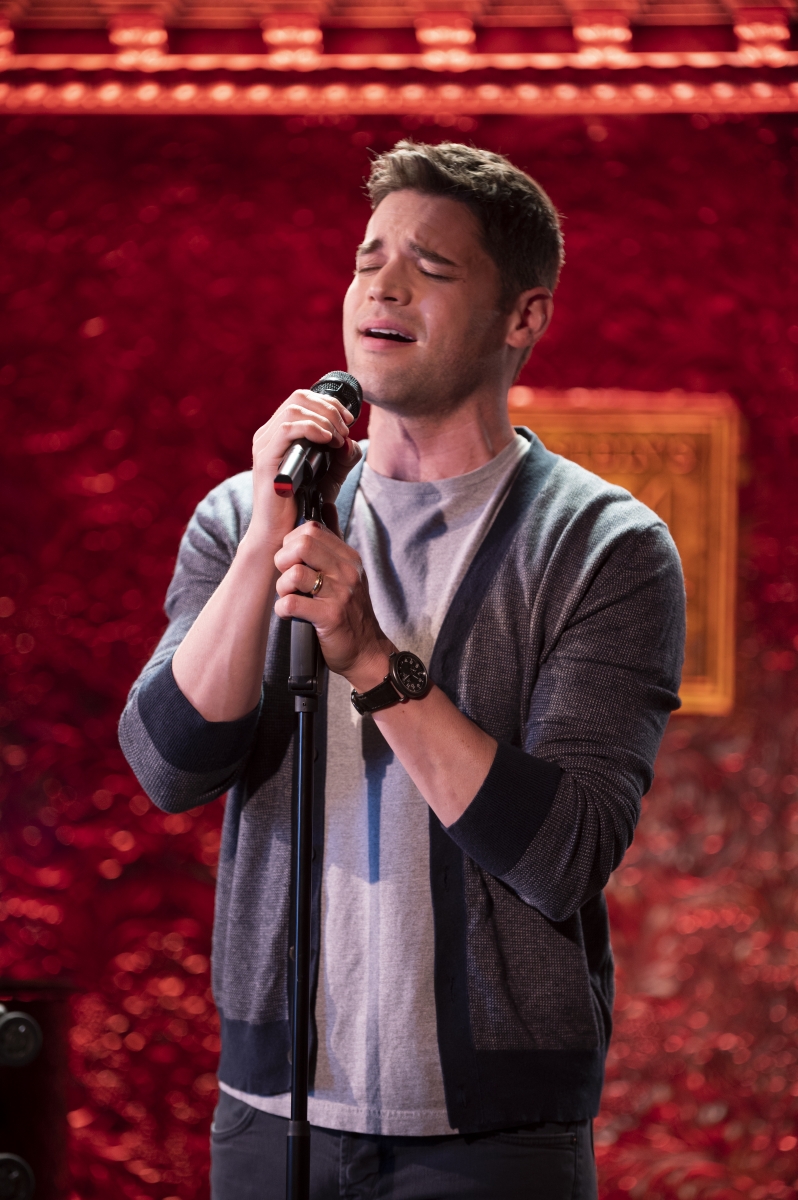 When we first started, I had met Ben cause we had done Hit List together, which was a one-off concert. And I can't even remember how he got that but I liked him a lot because he had a calming effect on me and he didn't feel like he was a know-it-all. He seemed to know what he was talking about, but without being rude about it. He was eager to please, but not in a way that diminished his talent and his potential. So when I started doing solo shows, I wanted to bring somebody on board that could grow with me because I didn't want someone that was going to bully me around and tell me I have to do this, I have to do this, this is how you do a concert, this is how you do a cabaret. I already knew from the very beginning that I didn't want to do things like everybody else. And I wanted someone that could grow with me and learn with me, but also provide an emotional and thoughtful kind of assessment to things. I'd also seen how good he was at putting medleys together, which I was always a big fan of. We meshed really well and he understood my sensibility right from the very beginning. He was one of the first persons I played any of my original songs for, and the way that he responded to them, even if he didn't love them, was really genuine and really kind. He's just got a really good heart and knows how to talk to people, knows how to uplift people and get the best out of them. And that's something that I think I really didn't know I needed, but found, thankfully.
When we first started, I had met Ben cause we had done Hit List together, which was a one-off concert. And I can't even remember how he got that but I liked him a lot because he had a calming effect on me and he didn't feel like he was a know-it-all. He seemed to know what he was talking about, but without being rude about it. He was eager to please, but not in a way that diminished his talent and his potential. So when I started doing solo shows, I wanted to bring somebody on board that could grow with me because I didn't want someone that was going to bully me around and tell me I have to do this, I have to do this, this is how you do a concert, this is how you do a cabaret. I already knew from the very beginning that I didn't want to do things like everybody else. And I wanted someone that could grow with me and learn with me, but also provide an emotional and thoughtful kind of assessment to things. I'd also seen how good he was at putting medleys together, which I was always a big fan of. We meshed really well and he understood my sensibility right from the very beginning. He was one of the first persons I played any of my original songs for, and the way that he responded to them, even if he didn't love them, was really genuine and really kind. He's just got a really good heart and knows how to talk to people, knows how to uplift people and get the best out of them. And that's something that I think I really didn't know I needed, but found, thankfully.
As a self-admitted shy person, when you first started doing solo shows was it difficult?
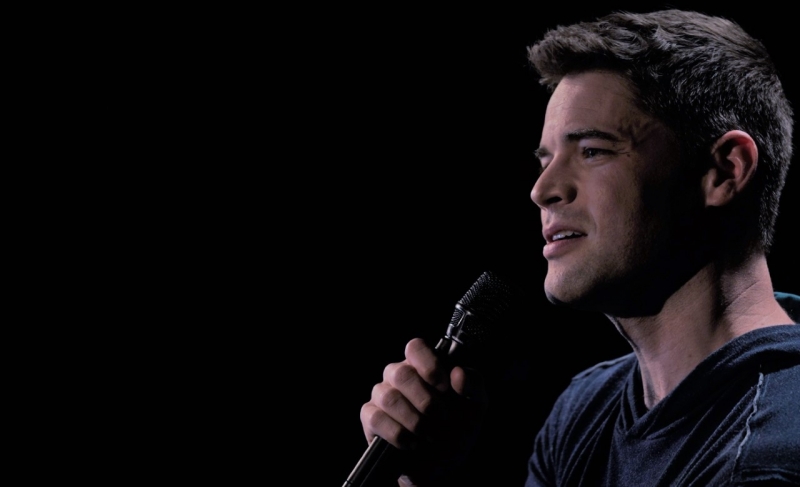 It was freeing. I had resisted doing them for a long time because I felt really uncomfortable being on stage as myself; super comfortable on stage as a character, singing somebody else's thing, not as Jeremy... but as soon as I had to go do a concert or a one-off where I was a guest star on stage, and I say something as me, I just froze. It was like, "Who am I? What is my thing?" And as soon as I got a second to iron that out for myself and figure it out, it was really helpful. It came really easily and naturally, and it was really freeing because it still felt performative. That's a great thing about doing these small cabarets for intimate audiences: everybody that comes to see you is already a fan. You're not going to buy a ticket to a 54 Below show, at least for the most part, unless you know who it is and already like their work, and you're excited to be entertained by someone that you're already a fan of. You've already won them over before you step inside. It's that much less pressure on you.
It was freeing. I had resisted doing them for a long time because I felt really uncomfortable being on stage as myself; super comfortable on stage as a character, singing somebody else's thing, not as Jeremy... but as soon as I had to go do a concert or a one-off where I was a guest star on stage, and I say something as me, I just froze. It was like, "Who am I? What is my thing?" And as soon as I got a second to iron that out for myself and figure it out, it was really helpful. It came really easily and naturally, and it was really freeing because it still felt performative. That's a great thing about doing these small cabarets for intimate audiences: everybody that comes to see you is already a fan. You're not going to buy a ticket to a 54 Below show, at least for the most part, unless you know who it is and already like their work, and you're excited to be entertained by someone that you're already a fan of. You've already won them over before you step inside. It's that much less pressure on you.
So yesterday I asked Benjamin a question that I want to tell you about. I asked him "If I ask Jeremy to tell me about Benjamin, what will he say?" and I'm kind of curious what you think he answered.
I think that he would say that I would say that he's the most loyal person, a really smart musician, just incredibly kind and thoughtful, and maybe slightly too hard on himself probably. But growing in confidence and in the strength of his own power, which I've been really proud of him, lately. Did I get any of it right? (Laughing) It's like the Newlywed Game...
(Laughing) Well, you'll find out! (Both laughing) You know what didn't come up that he was sure that you would mention: his obsession with mermaids.
Oh, well... that doesn't define him. (Laughing)
You've made a lot of movies and television, but the film of Carry On that's going to debut for 54 Below Premieres is something that comes from a really deep place inside of you. Did you have any issues letting go of the experience while they were filming you?
Still working on it.
Really.
Yeah. It had been over a year since we had done it on stage and I had rewritten a lot of it, maybe 20% of it I had to change because we didn't have an audience. I had to change up a couple of the numbers, I got rid of The Greatest Showman song because we had already released it online and I felt like I've told that story so many times. So I really had to do a lot of work to put it together. And then we never had a chance to run it or do a dress rehearsal or do a full thing... we had one band rehearsal. The whole show is 80 plus minutes of me talking or singing the whole time. It's just monologue, monologue, monologue, song, song, song, song. And they gave us five hours to shoot the whole thing. When you haven't really done anything full out for so long, you're going to mess up. So having only five hours to shoot it was really stressful for me because I wanted it to be as perfect as possible. It didn't matter how many times I drilled the scene and drilled the monologues and drilled the songs - I was going to mess stuff up. Nerves or a voice crack or a hiccup - anything can happen.
It was weird to do some of it without the audience response... hoping that they're at home watching it and being able to connect, and not on their phones, not just kind of half watching half listening because I'm sure that will happen, and I just kind of try not to think about it. (laughing) That's the medium that we're in, and this kind of storytelling is best told when you have a hundred percent focus - I wish I could put it in a movie theater. It's a strange little COVID experiment and hopefully, it'll turn out positively and people will react really positively to it, and I'll have sort of completed that journey, I think.
Jeremy Jordan CARRY ON debuts May 6th and runs through May 27.
For information and tickets to Jeremy Jordan CARRY ON visit the 54 Below website HERE
Visit the Jeremy Jordan website HERE.
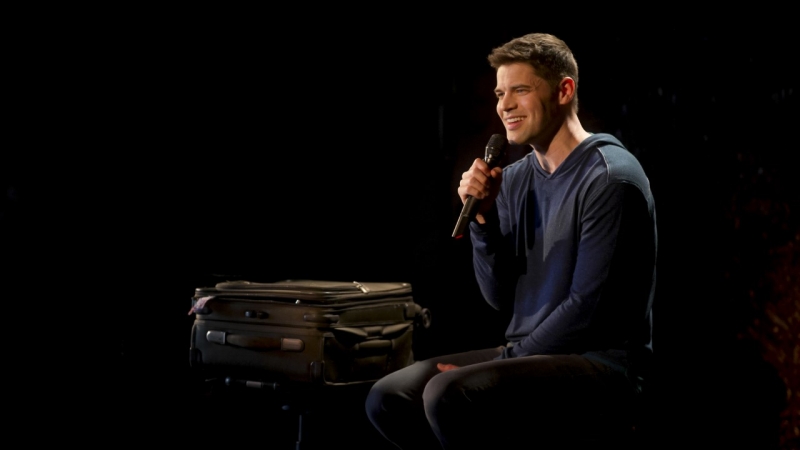
Comments
Videos

